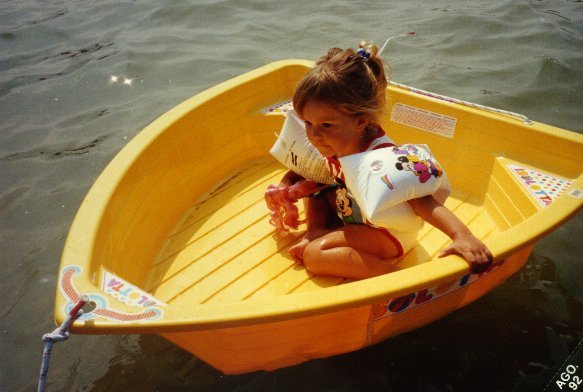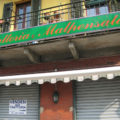Men, you have no idea how important it is to have a bra fit well. (I suppose there might be something analogous in male attire, but probably not something that most of you have to wear every day.) Well, I’m here to tell you: it’s critical. It is extremely hard to get bras to fit right, and a constant, nagging discomfort when they don’t. Perhaps that’s why a lot of women I know hate to shop for bras. We know we’re going to spend hours rifling through racks and trying things on (when every trip in and out of the fitting room means getting undressed and redressed completely), and still go home with something that doesn’t quite work. Shopping with friends can take the edge off by making the whole situation very funny: you find the most ridiculous bras you can and try them on for each other, laughing uproariously and wondering who the hell would ever wear that for real.
One difficulty in buying bras is that they don’t all fit the same way, even within a given size. Just like clothing, bras come in different styles, and some styles work better with your body shape than others. If, like me, you wear an unusual size, finding anything at all in that size can be tricky.
There used to exist a cadre of women who actually knew how to fit bras, and worked in department stores sharing this knowledge with the benighted masses. They could tell you exactly what was wrong with each bra you tried on, and, after you’d rejected half a dozen, would trot out to the racks and instantly, unerringly, lay their hands on the item that would fit.
Macy’s used to have them, but the Macy’s ladies appear to have gone the way of the dodo. So I now know of only one place on earth where buying bras is relatively painless: Lady Grace. I just realized looking at their website that it’s actually a chain, with locations in Massachusetts, New Hampshire, and Maine. I’ve only been to the store in Brookline. When I first started going there, thanks to a friend, around fifteen years ago, their fitters were the classic little old ladies. Now they’re young ladies, but, thank God, the wisdom has been passed on. On my recent visit to Boston, I spent an hour and a half in Lady Grace, departing with seven new bras, and a whole new world of comfort.
There’s one difficulty that a single visit can’t resolve. Many breasts are not the same size all month. Water retention before our periods makes them swell (and become tender – no touchy!), so a bra that fits well the first week of our cycle won’t later on. So, yes, there is a reason why we need about two dozen bras in service in any given month.
Bra Straps
What is it with the visible bra straps these days? There’s something in my upbringing, American or Asian, I dunno, that tells me that only sluts let their bra straps show. I could never wear spaghetti-strap tops or dresses because I absolutely need to wear a bra, and there’d be no way to hide its straps. (Yes, there are strapless bras, I have one because of a bridesmaid’s dress I had to wear once, but it’s practically a corset – doesn’t exactly fit with the carefree look one is trying to create with spaghetti straps.)
But lately I see girls and women letting the straps of their bras – and sometimes backs and fronts! – just hang out of whatever they’re wearing. I can’t help but think it looks trashy. Not to mention, in some cases, REALLY stupid (yes, even on Sarah Jessica Parker in Sex & the City). Honey, that backless black halter top with the white bra entirely visible from the back? Not workin’ for ya.
In Italy there are bras with transparent plastic shoulder straps which are supposed to resolve this problem, but it just doesn’t work. No matter how transparent, the straps are clearly not skin, especially when they’re digging into the shoulder. You might fool the eye at a distance, but that’s not really the point, is it?
So my advice to my daughter has been: enjoy the braless look while you still can, and give it up when it’s time to.
More on Bras
August 20, 2003
(Another of those articles that generated responses!)
A woman friend forwarded this to me: “A good friend is like a good bra: hard to find, very comfortable, supportive, holds you up when you are down, and always close to the heart.”
Buying bras in less-developed countries was very difficult back in the 1970s-80s. Sally Kibblewhite, who was my English teacher at Woodstock, wrote me: “The thought of you going off with seven bras reminded me of the selection I had when we set off for India, because we had been advised that bazaar bras were not ideal. I had washed them and they were drying in the sitting room of David’s brother’s house. He never forgot this vision of many pastel-coloured bras dangling from the clothes horse, and regularly asked me how my bras were going.”
I wish someone had thought to warn me about the less-than-idealness of bras in India. When we left the US for Bangladesh, my breasts weren’t large enough to worry about wearing bras, and none of us thought ahead to the time when they might be (my then-stepmother rarely wore a bra herself, being an uninhibited flower-child type, and small-breasted). By the time I got to boarding school at Woodstock 18 months later, I needed a bra. Being socially naive, I didn’t realize this until I took a dip in a cold river (wearing a T-shirt) during our 9th grade class hike, exciting much comment. Then my family had to scramble to get hold of some bras somehow. In India in those days, all bras were made the same way, of heavy cotton, with the cups sewn in a spiral to maximize pointiness – not what a blushing adolescent wants for her first bra, even if there had been any small enough to fit. We had to get my stepmother’s parents to mail me some “training” bras from Pittsburgh. (My dad’s running joke was that training bras are to train the boys how to undo them.)
Re. fitting bras in more modern times and places, Mike Looijmans suggests:
“Bring your (boy)friend and have him run up and down the aisle with bras. That saves you from having to undress and dress multiple times. He’ll have a chance to peek at half-dressed women (if all’s right, he’ll mostly be looking at you) in need of bras. Also, at the end of the afternoon, he’ll have a good idea of what size you are, so that if he wants to give you something naughty to wear, it’ll at least be somewhere near the right size.”
He adds: “I don’t think I’d take two women shopping for bras together seriously… While the two of you were doing that girlish giggling in the dressing room I’d probably be holding out a cupped hand and asking the kind lady in the shop for “about this size…” 😉 ”
In regards to my rant about today’s “anything shows” attitude, Mike and a few others pointed out that a décolleté lined with lace can look very classy instead of slutty. For the older generations (which doesn’t include Mike), back in the day when there was less flesh in general view, a mere glimpse of lingerie could be very exciting. Mike points out a solution for the straps problem: “My girlfriend has a bra that ends in two spaghetti straps on either side. If worn under something with a spaghetti strap, there’ll be a total of three straps on each shoulder, and that looks like it’s meant to be so. (strapless isn’t an option for her either).” My daughter has now found some bras like this, and they do look great. However, Benetton doesn’t have sizes to fit me!
Yesterday in the supermarket we saw another non-solution: a woman was wearing a low-backed sundress, so that the back of her bra was completely in view (and the front wasn’t entirely covered, either). I am not offended by total nudity (though I might find it surprising at the supermarket), but that, to me, just looked completely trashy. (She must have been a tourist. The ladies of Lecco often dress even more elegantly than the Milanese.)
Mike gets the final word on this one: “Now we’re on that topic anyway, am I the only guy who thinks a [full] bathing suit looks much sexier than a bikini?”









